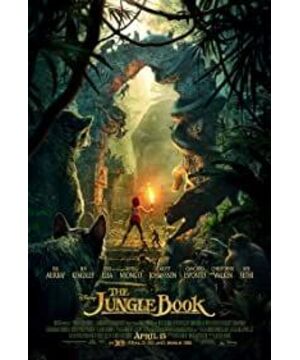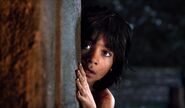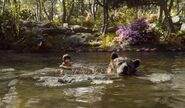Kipling, a middle-aged man with a moustache in India, looked at the relationship between man and nature from a colonial perspective in a jungle full of dampness and mystery. What will happen on the animal side, and what will happen on the human side. Therefore, this is the so-called dualistic analysis of human nature, which is a literary theme and the fundamental difference between humans and animals. The Jungle Book is composed of several short stories about animals, mainly about the adventures of the boy Mowgli in the jungle. He was abandoned by humans since he was a child, raised by a wolf mother, and grew up with many wolves. Later, he met a bear. A python, a black leopard, these four form a stable relationship in the four corners of the jungle, plus a big tiger who always wants to kill him, this book will later become a human jungle life history, which is the life of our human ancestors. History. In addition to Mowgli, who has the aura of the protagonist, the rest of the articles are also written about animals, and they are written very vividly.
I first came into contact with Kipling through an Indian movie. The name has long been forgotten, but the content is related to the wolf child, because the modern Western literature about the wolf child belongs to Kipling. There are also experiences of the wolf child in India. The wolf child's research began when he was a reporter in India. It was not easy to be a reporter in the colonies. It is always refreshing to study the customs of other places like Morgan, but he undertakes the mission of reporting the local customs of India. To put it bluntly, Colonization, we cannot understand now, why Kipling, as a literary pioneer in the late British Empire, was able to find the most hidden destination in the depths of the human soul in the dense Indian jungle, which is the natural attributes of human beings, or in other words, human nature noodle.
When it comes to the British Empire, this behemoth disintegrated more than a hundred years ago, and in the post-colonial era, it still throws a barrier in people's hearts. The word colonization alone is enough to deeply fear the Chinese people in the agricultural era. This Leviathan has imprints all over the world. But for the mystery of the jungle or the depths of nature, it is powerless, so the British or the Western world can put down the sins from the colonial era, trapping themselves.
In the jungle, the first hegemony Mowgli faced was the tiger, but for us in the age of human industrial civilization, this tiger is the last impression we miss in the wilderness, just as we Chinese miss the long-lost countryside. Just like the custom, human cognition always blindly believes that the standard of civilization should be the way of human beings, not the way of animals or virgin forests.
Therefore, in the colonial era, Kipling always wanted to use colonial tunes to discuss people as animals, and to control the entire jungle through flames. In fact, it went against people's own cognition, because Mowgli is not a human being. , is not a complete animal for animals, he is not considered a real wolf, see Hayao Miyazaki's Mononoke Princess San for the specific plot. Therefore, such animal narratives can only anthropomorphize animals and animals, resulting in the illusion of the jungle written by Kipling himself, so Mowgli had to embark on the road of wandering. This in colonial times, the human mind could not be reconciled, because human sin and expansion went forward at the same time, to one place, import opium, slave trade. No wonder the tiger would not forgive Mowgli, because the tiger is a certain aspect of us in the East.
Now speaking of the background of human wandering in the post-colonial era, it is mainly revealed through Coetzee. Kipling wrote about human beings in the colonial period. In the case of being unable to reconcile with nature, colonization was changed to a more moderate economic and cultural means. The organization of the whole world is getting stronger and stronger, and the socialization requirements of people are getting higher and higher, so Mowgli has lost the way to return to the jungle and can only wander on the fringes of society.
Coetzee was the winner of the Nobel Prize for Literature in 2002 and grew up in South Africa, where apartheid prevailed, when Mandela was still in prison, and Gordimer had written the masterpiece "The People of July". Coetzee published his works relatively late. His first novel "The Deep Outback" was published at the age of 34, and his famous work, "The Times and Life of Michael K.", was published at the age of 40 and won the Booker Prize in 2003. He won the Nobel Prize for Literature for "Shame".
The "k" I'm talking about alone today. If you pay attention, you will find that Coetzee is a white Afrikaans of Dutch descent. His ancestor Jacques Coetzee once led an expedition deep into the territory of the Africans to carry out colonial expeditions, resulting in a large number of local people being killed by the colonists. He is also a writer who grew up in Western culture. Kipling is a condescending scrutinizer in India with a colonial vision, while Coetzee has already noticed the human condition in the post-colonial era. He can neither return to the jungle and become marginalized in society. The human side has already embarked on the road of the modern wasteland where life and death are uncertain, and the soul wanders all his life and cannot be liberated.
"The Times and Life of Michael K" is about K, a disabled gardener who, in censorship-ridden South African society, wants to go back to his hometown with his nanny mother. At that time, the white government suppressed the local indigenous people, and the whole country was under martial law. When applying for the pass, the bureaucracy of the South African government made things difficult, so that it was not completed. Had to take the risk of dragging his mother with a cart and hit the road alone. On the way, he was harassed by soldiers at various levels, his money was robbed, his mother died on the road, whether he had a job or not, he became a person who lost his identity. The next encounter is the same as that of the homeless people in our current society in China. The pumpkins they collected were robbed, they worked as coolies in concentration camps for a living, and they were caught by the military countless times. Building his own shack in the cave, he just wants to have a pumpkin patch of his own and be self-reliant. But he has repeatedly lowered his own survival requirements, just in exchange for freedom. In the end, this ideal was shattered, standing in the pumpkin field and fantasized about being free, but the reality is self-inflicted.
To sum up, Coetzee's novels never leave room for people, so his style of writing is dignified and cold, and there is no hope for humanity. And this atmosphere is precisely the living environment of people in the post-colonial era. If we look at China, such an environment is ubiquitous. The cold high-rise buildings, the expressionless face, the generation of slaves and slaves, and various environmental pollutions are enough to show that people's living conditions are still wandering. on the way, farther and farther.
If we look around the world, we will be amazed at the soft power of economic and cultural colonial means, but this time the rulers are not any country, but those commercial imperialists who control resources and government, and every civilian has been recruited to participate in Colonial expansion of globalization. Therefore, individuals all over the world have become individual atoms, unable to return to the jungle or family life, at least, there will be encounters like k, and the wandering of the mind will begin, and there will be no purpose and no end.
I have to be desperate when it comes to human existence. Now there are many people involved in life, and they never care how their existence will affect others. A single atom, in a weak colonial environment, can experience the thrill of death without burial, and can excavate everywhere. The survival of desertification is scarce.
View more about The Jungle Book reviews











